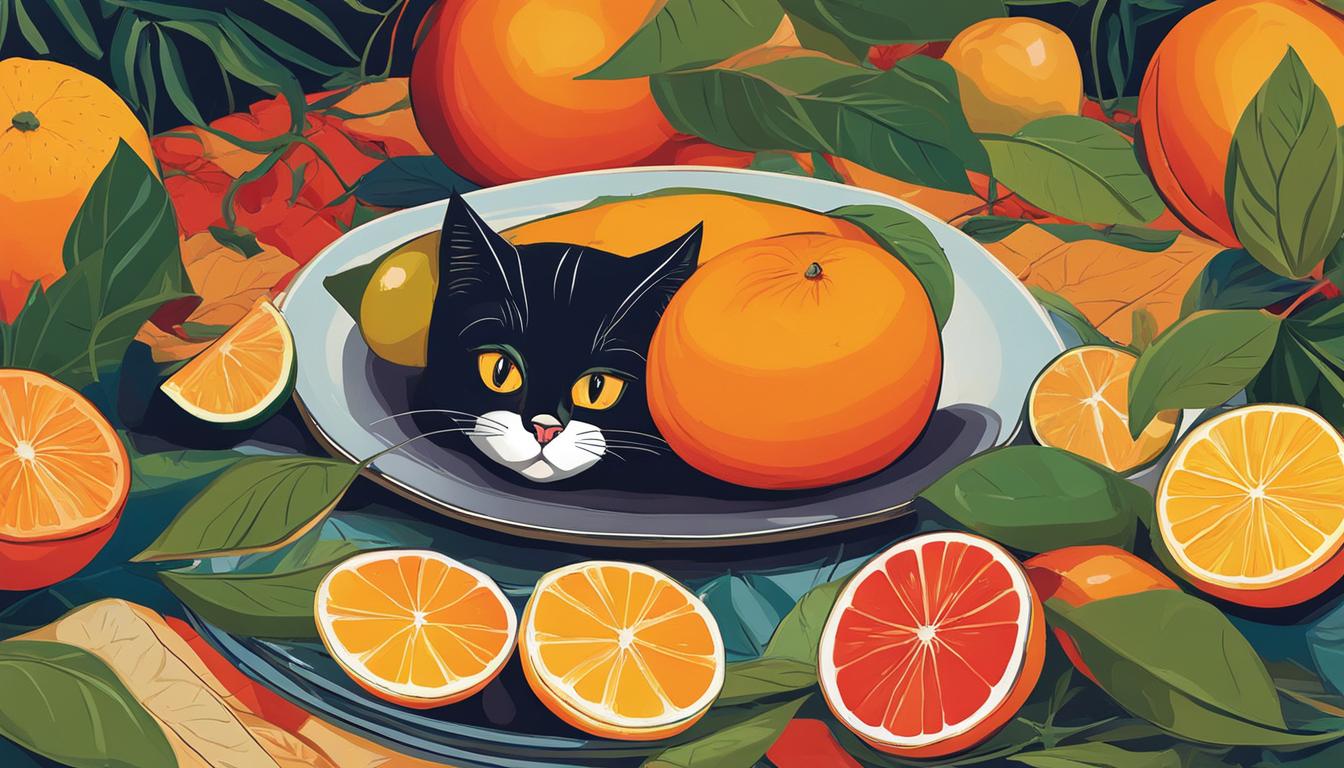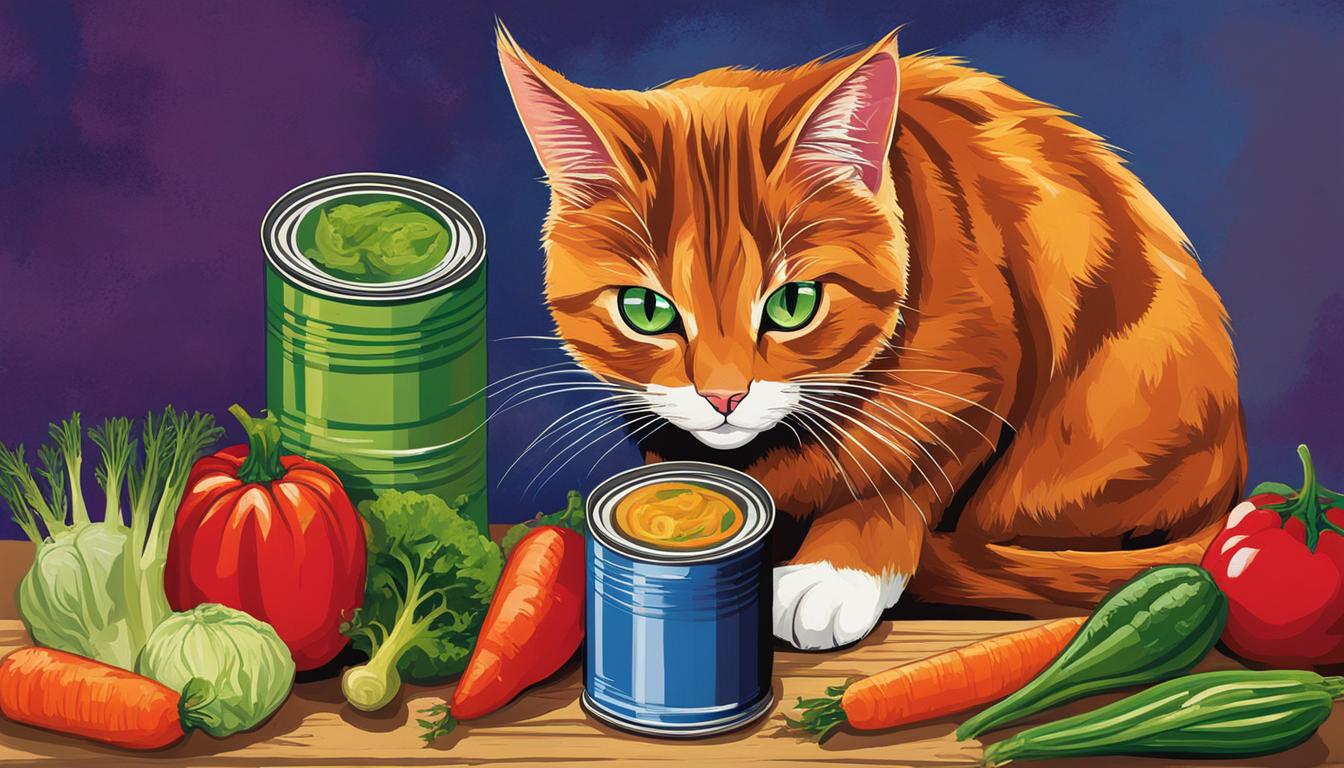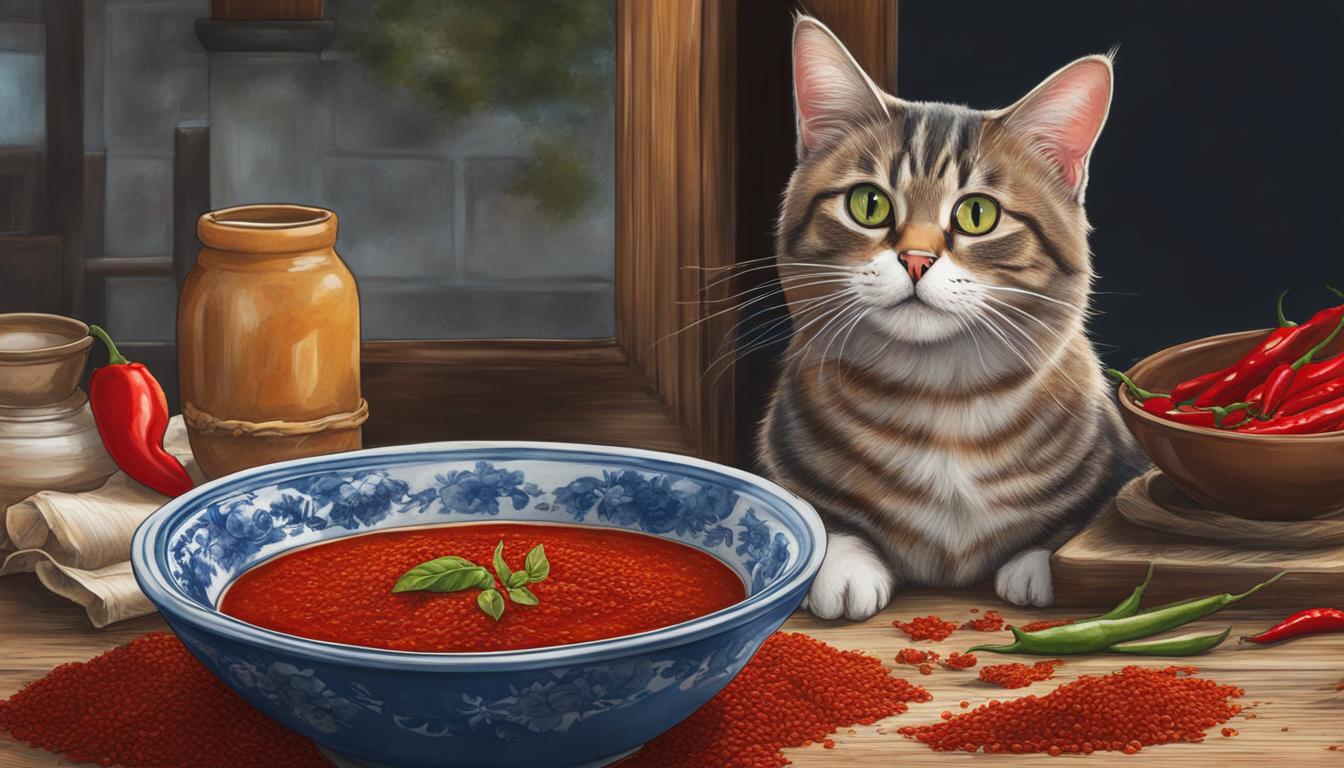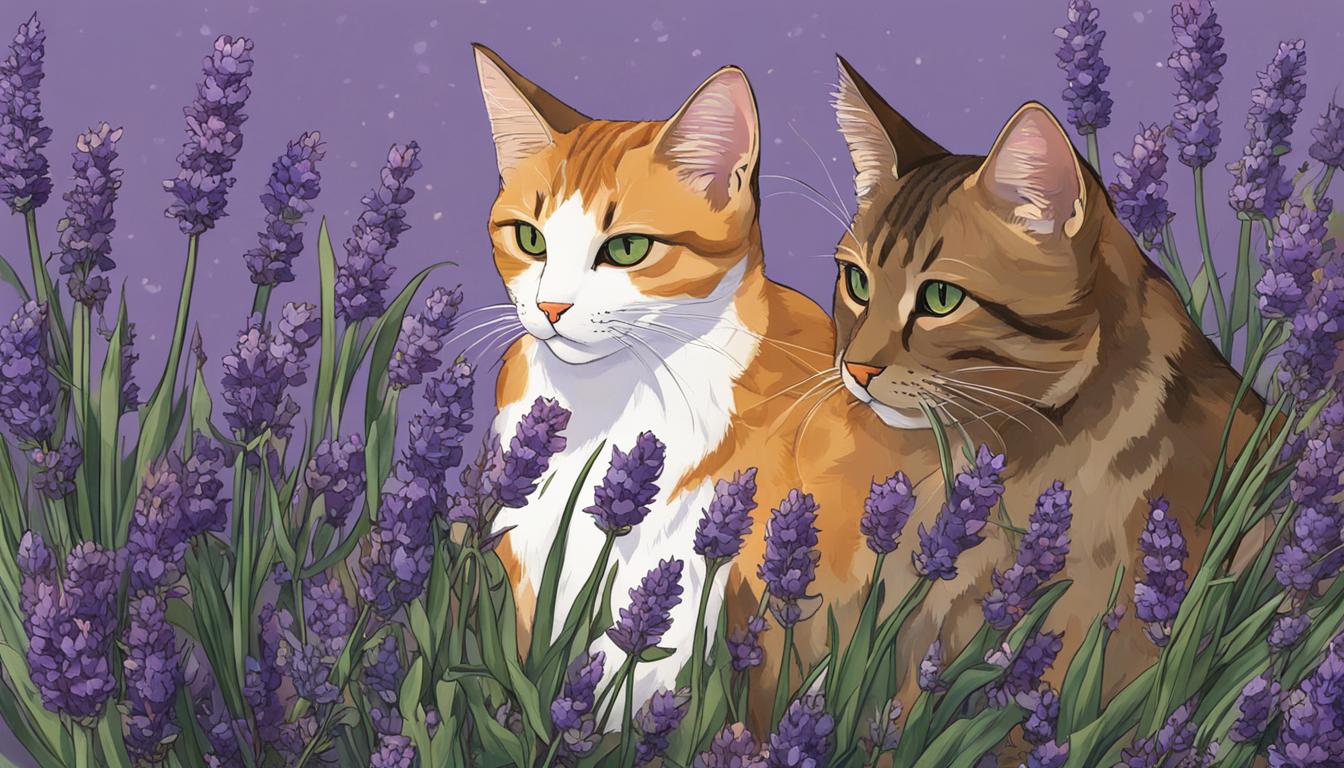Curiosity killed the cat, or so they say. But when it comes to cats and citrus fruits, it’s not just curiosity that can be dangerous. As a cat owner, you may have wondered whether your feline friend can indulge in a juicy orange slice or nibble on a tangy lemon. However, it’s essential to understand the potential risks and take precautions to keep your cat’s diet safe and healthy.
While citrus fruits like oranges, lemons, and grapefruits might seem harmless to us, they can be toxic to our feline companions. These fruits contain citric acid and essential oils that can wreak havoc on a cat’s delicate system. In large quantities, they can even be fatal, causing tremors, seizures, and other serious health complications.
It’s not just the flesh of citrus fruits that poses a risk. The peels contain psoralens, which can lead to photosensitivity and skin reactions in cats. Even the scent of citrus can be problematic for our furry friends, so it’s best to avoid exposing them to any products with citrus scents or essential oils.
Key Takeaways:
- Citrus fruits like oranges, lemons, and grapefruits are not safe for cats to eat.
- These fruits contain citric acid and essential oils that can be toxic to cats.
- Cats can experience symptoms such as tremors, seizures, and gastrointestinal problems if they consume citrus fruits.
- The peels of citrus fruits contain psoralens, which can lead to photosensitivity and skin reactions in cats.
- To ensure your cat’s safety, it’s best to avoid feeding them citrus fruits and products with citrus scents or essential oils.
Common Foods that are Dangerous to Cats
As cat owners, we must be diligent in keeping our feline friends safe and healthy. While it may be tempting to share our own meals with them, there are certain foods that are toxic to cats and should be avoided at all costs. Knowing which foods are dangerous is crucial to ensure the well-being of our furry companions.
Here are some common foods that are dangerous to cats:
- Grapes and raisins: These fruits can cause kidney failure in cats.
- Allium vegetables: Onions, garlic, and other allium vegetables can lead to anemia and digestive problems in cats.
- Chocolate and caffeine: These substances contain theobromine and caffeine, which can cause neurological symptoms in cats.
- Alcohol: Even small amounts of alcohol can be toxic to cats, leading to liver damage and other serious health issues.
- Raw meat and eggs: These foods can harbor harmful bacteria and parasites, causing digestive problems in cats.
- Animal bones: Splintered bones can cause choking hazards, internal injuries, and blockages in a cat’s digestive system.
- Dairy products: Cats are lactose intolerant, and consuming dairy can lead to digestive upset.
- Xylitol: This sweetener, commonly found in gum and sugar-free products, can cause low blood sugar and liver damage in cats.
- Dog food: Cats have different nutritional needs than dogs, and feeding them dog food can result in nutritional deficiencies.
It is essential to keep these foods out of your cat’s reach and provide them with a balanced, cat-specific diet that meets their nutritional requirements. Remember, a little extra caution can go a long way in keeping our beloved feline companions safe and healthy.
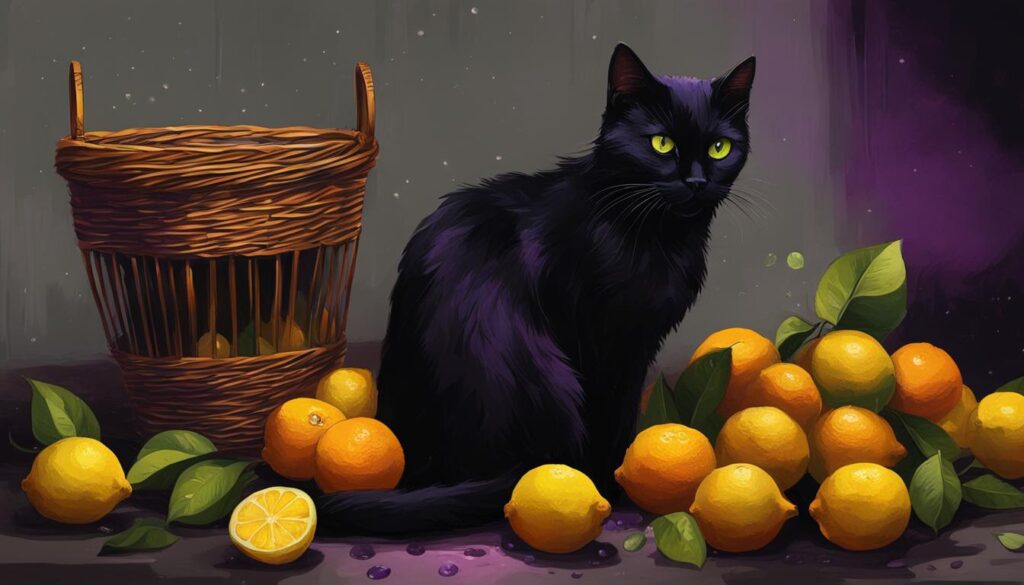
The Dangers of Certain Fruits and Vegetables
Cats are obligate carnivores, which means their bodies are designed to thrive on a diet primarily composed of meat. While some fruits and vegetables can be safe for cats in small quantities, others can pose potential risks.
For example, citrus fruits like oranges, lemons, and grapefruits contain citric acid and essential oils that can be toxic to cats. Consumption of these fruits can lead to symptoms such as tremors, seizures, and gastrointestinal problems.
On the other hand, some cat-friendly fruits such as blueberries, strawberries, bananas, and apples (peeled and cored) can be given as occasional treats. These fruits offer nutritional benefits and can serve as a healthy addition to a cat’s diet when offered in moderation.
| Fruits Safe for Cats | Fruits to Avoid |
|---|---|
| Blueberries | Citrus fruits (oranges, lemons, grapefruits) |
| Strawberries | Grapes and raisins |
| Bananas | |
| Apples (peeled and cored) |
Remember, treats should only make up a small portion of a cat’s overall caloric intake and should not replace a balanced, species-appropriate cat food. Consult with your veterinarian for specific dietary recommendations and always prioritize your cat’s health and well-being.
The Dangers of Citrus Fruits for Cats
When it comes to feline diets, it is important to be aware of the dangers that certain foods can pose to our furry companions. One such food group that cat owners should be cautious about is citrus fruits. While citrus fruits like oranges, lemons, and grapefruits are packed with vitamins and nutrients for humans, they can be toxic to cats if ingested. The dangers of citrus fruits for cats stem from the presence of citric acid, essential oils, and psoralens.
When cats consume citric acid found in citrus fruits, it can irritate their nervous system, leading to symptoms such as depression, tremors, and even seizures. Additionally, the essential oils present in citrus fruits can also have a detrimental effect on cats’ health. These oils can cause gastrointestinal problems like vomiting and diarrhea, leaving cats uncomfortable and potentially dehydrated.
Furthermore, the peels of citrus fruits contain psoralens, compounds that can cause photosensitivity and skin reactions in cats. These reactions can range from mild itchiness and redness to more severe allergies and dermatitis. It is crucial to keep cats away from citrus fruits and ensure that they are not exposed to citrus essential oils or other products with citrus scents.
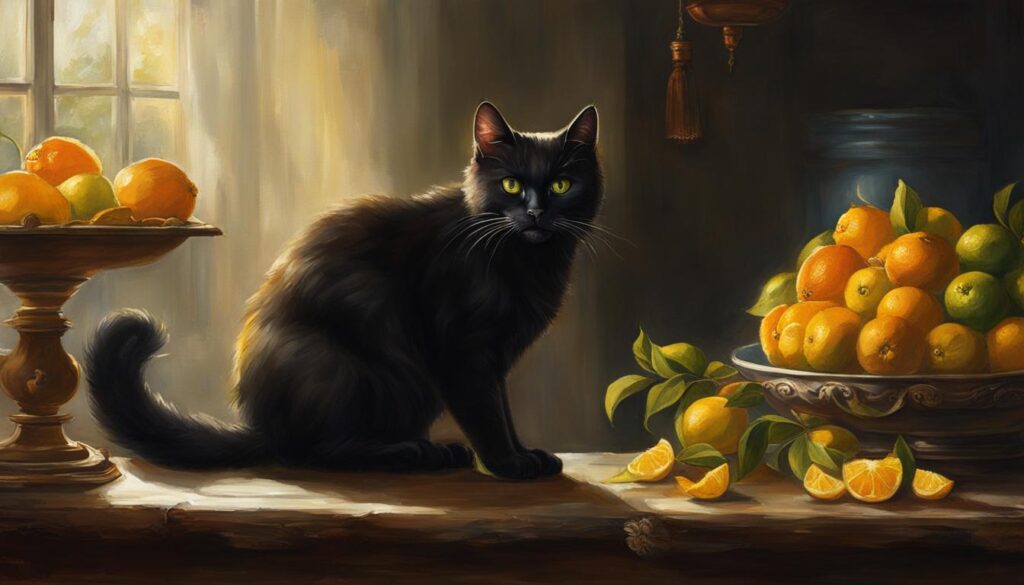
“Cats should avoid citrus fruits as they can be toxic and cause various health issues.”
Citrus Toxicity and Allergies in Cats
Citrus toxicity in cats can vary depending on the individual cat’s sensitivity and the amount of citrus fruit ingested. While some cats may only experience mild symptoms like stomach upset, others can develop severe reactions that require immediate veterinary attention. It is always better to err on the side of caution and avoid feeding citrus fruits to cats altogether.
If you suspect that your cat has ingested citrus fruit or is showing signs of citrus fruit allergies or toxicity, it is important to seek veterinary care promptly. The veterinarian can provide appropriate guidance, perform necessary tests, and administer treatment to ensure the cat’s wellbeing and recovery. Remember, a healthy and balanced feline diet should consist of cat-specific foods that are free from potentially harmful ingredients.
| Symptoms of Citrus Toxicity in Cats | Signs of Citrus Allergies in Cats |
|---|---|
| Tremors | Itchiness |
| Seizures | Redness and swelling |
| Depression | Hives or rashes |
| Vomiting | Difficulty breathing |
| Diarrhea | Excessive drooling |
Citrus Fruit Safety Tips for Cats
To keep your cat safe and healthy, it is essential to adhere to some citrus fruit safety tips:
- Avoid feeding citrus fruits to your cat altogether.
- Ensure that your cat does not have access to any citrus fruits or their peels.
- Keep citrus essential oils and scented products out of your cat’s reach.
- If you use citrus-scented cleaning products, make sure to keep your cat away from the freshly cleaned areas until the scent dissipates.
By following these safety measures, you can help protect your feline friend from the potential dangers associated with citrus fruits and ensure they live a healthy and happy life.
Safe Fruit Alternatives for Cats
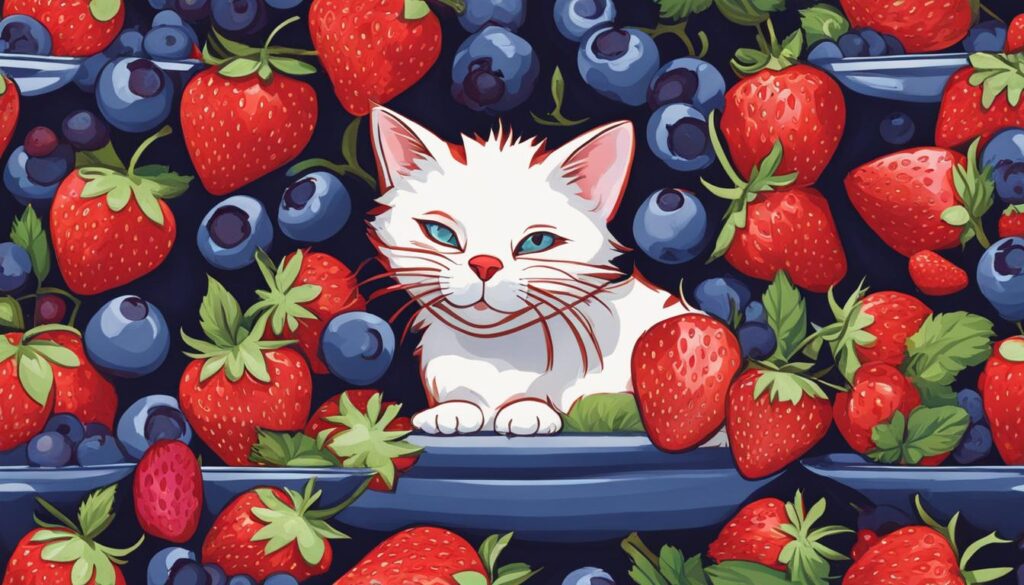
While cats should not eat citrus fruits, there are some safe fruit alternatives that can be enjoyed in moderation. These cat-friendly fruits provide a variety of flavors and can be a healthy addition to a cat’s diet. Here are some safe fruit options to consider:
1. Blueberries
Blueberries are packed with antioxidants and can provide a sweet treat for cats. They are low in calories and high in fiber, making them a nutritious choice. Cats can enjoy a few blueberries as an occasional treat.
2. Strawberries
Strawberries are another safe fruit option for cats. They are juicy and delicious, providing essential vitamins and minerals. However, it is important to remove the green leafy tops before offering strawberries to cats.
3. Bananas
Bananas are a cat-friendly fruit that is rich in potassium and fiber. They can be mashed and mixed with a cat’s regular food as a tasty and healthy addition. Cats can enjoy a small amount of banana as an occasional treat.
4. Apples (Peeled and Cored)
Apples are safe for cats when they are peeled and cored. They provide a crunchy texture and can help clean a cat’s teeth. However, it is important to remove the seeds and core, as they can be harmful to cats.
5. Melons
Melons like watermelon and cantaloupe can be a refreshing treat for cats. They are hydrating and contain essential vitamins and minerals. Cats can enjoy small, bite-sized pieces of melon as a special treat.
It is important to note that while these fruits are safe for cats, they should only be given in moderation. Treats should not make up a large portion of a cat’s diet and should not replace a balanced, species-appropriate cat food. Always consult with a veterinarian before introducing new foods into your cat’s diet.
Conclusion
After exploring the topic of cats and citrus fruits, it is clear that these fruits should not be a part of a feline’s diet. The presence of citric acid, essential oils, and psoralens in citrus fruits can have toxic effects on cats, leading to symptoms such as tremors, seizures, and gastrointestinal problems. It is crucial for cat owners to prioritize their pets’ safety and well-being by understanding the dangers of toxic foods.
When it comes to cat food safety, it is essential to keep in mind that certain human foods can be harmful to our furry friends. Citrus fruits, along with other items like grapes, onions, chocolate, and alcohol, should never find their way into a cat’s bowl. These foods can cause serious health issues, ranging from kidney failure to nutritional deficiencies.
To ensure the optimal health of our cats, it is recommended to provide them with a balanced, cat-specific diet. While cats should not eat citrus fruits, there are safe alternatives available. Fruits like blueberries, strawberries, bananas, apples, and melons can be given as occasional treats, but it is important to remember that they should only make up a small portion of a cat’s overall caloric intake.
If you suspect that your cat has consumed citrus fruit or any other toxic food, it is crucial to seek guidance from a veterinarian. They can provide the appropriate treatment and ensure the well-being of your feline companion. Remember, a well-informed cat owner is the key to keeping our beloved pets safe and healthy.
FAQ
Can cats eat citrus fruits?
No, cats should not eat citrus fruits like oranges, lemons, or grapefruits. These fruits contain citric acid and essential oils that can be toxic to cats.
Why are citrus fruits dangerous for cats?
Citrus fruits can irritate a cat’s nervous system, leading to symptoms such as depression, tremors, and seizures. The citric acid in citrus fruits can also cause gastrointestinal problems. The peels of citrus fruits contain psoralens, which can cause photosensitivity and skin reactions in cats.
Are there any fruits that are safe for cats to eat?
Yes, there are some fruits that are safe for cats to enjoy in moderation, such as blueberries, strawberries, bananas, apples (peeled and cored), and melons.
What happens if a cat eats citrus fruit?
If a cat eats citrus fruit, it can experience symptoms such as gastrointestinal upset, tremors, seizures, and even death in large quantities. It is best to contact a veterinarian for guidance and appropriate treatment.
What other foods are dangerous for cats?
Cats should also avoid eating grapes and raisins, allium vegetables (onions, garlic, etc.), chocolate and caffeine, alcohol, raw meat and eggs, animal bones, dairy products, xylitol, and dog food.

